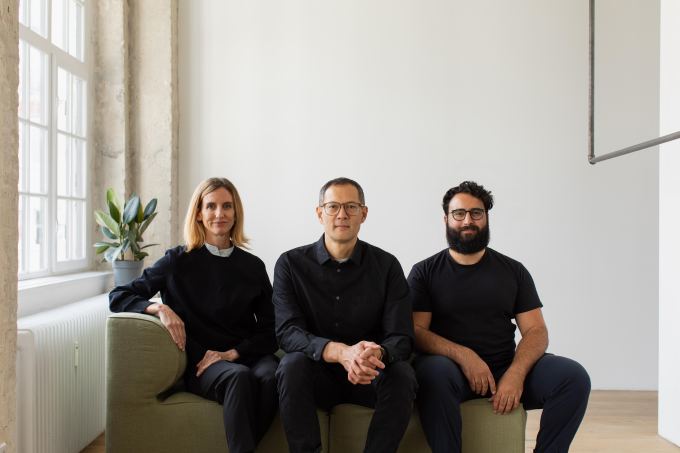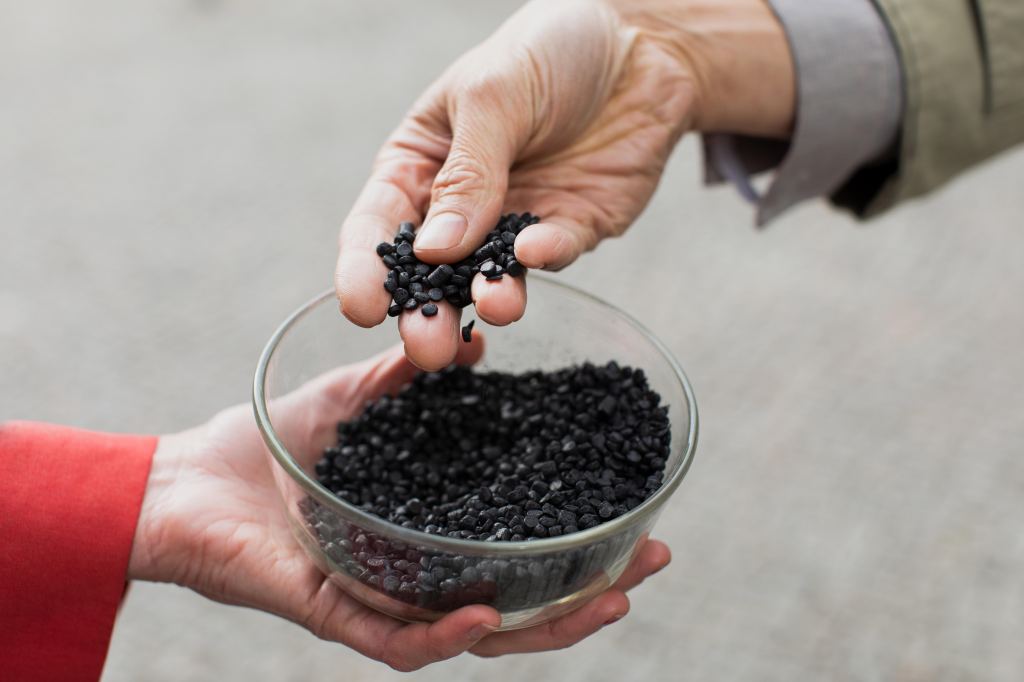Berlin-based climate tech startup Made of Air has closed a €5 million (~$5.8 million) seed funding round, led by Norwegian sustainability-focused family fund, TD Veen.
Also participating are Patrick Pichette (former CFO of Google and chairman of the board of Twitter), EQT Foundation, Thomas Von Koch (co-founder and former CEO of EQT Group), Tuesday Capital, the co-founders of Pexip and Olympic gold medalist skier, Aksel Lund Svindal.
As the name (kind of) implies, Made of Air (MoA) is producing durable materials for a variety of use cases that make use of (pyrolyzed) wood waste in order to lock up carbon for long periods in the resulting hardened carbon-negative thermoplastic compound. (Which is literally made from biochar and bioplastics).
MoA is intending this carbon sequestration product to offer an alternative to fossil-based thermoplastics for use cases where the material has a long life, and it has some early experimental partnerships with car maker Audi (producing façade panels for an installation on its marquee dealership) and with the fashion chain H&M (creating biomass-based sunglasses, among other experimental projects).
It also has a partnership with an unnamed U.S.-based furniture maker.
“Our feedstock is a biomass waste stream from forestry. So the waste stream that we’re looking at is from sawdust and small chip sizes from the forestry industry and what’s happening is in the cut of the trees for timber products — usually for construction — you have a lot of products going down stream from that process and we are at the very end of that process,” explains founder and CEO Allison Dring.
“This is waste that otherwise is going to be landfilled or gasified or burned, and in all three of those cases you have the loss of the CO2 storage in the material.”
“In the pyrolysis step — so in the process of making it into biochar — we’re actually taking the CO2 that’s in the material and we’re converting it into pretty close to an elemental carbon. So in that stuff you actually lock into a material. It doesn’t retain in a gas form — which is a lot of indirect air capture, I think you hear about that — you have a gas sometimes then you have an issue about what to do with the gas — here we’re locked into elemental carbon which doesn’t go back to CO2.”
The 2016-founded materials startup has shipped over 10 tons of materials to date to more than four different customers.
“These are more strategic partners looking to decarbonize their supply chain with our carbon-negative materials,” says Dring. “Industries with the highest emission reduction needs are the built environment, automotive/mobility and consumer goods.”
While there can be environmental and other concerns attached to the biomass industry — such as if trees that wouldn’t otherwise be cut down are chopped down just to burn for energy or crops which could be used for food are instead burnt for fuel — Dring says they are not using biomass from non-forestry trees that could otherwise not be cut down and could be left to continue capturing carbon as they grow.
She also notes that the material they produce can be created from other types of biomass.
“What we’re looking at is that waste stream right now. Obviously we can do this with other biomass waste streams. We’re looking at how we can regionalize it,” she tells TechCrunch. “So it’s not about relying on one type — we can do this process with any plant material that has photosynthesized. What we don’t want to do is interrupt or cause any fluctuation in the food supply, so we don’t want to — by our demand for our product — create a monocrop on the other side for agriculture.
“So we are looking at non-food supplies or some kind of feedstock that comes from food waste that’s plentiful. So we look at the bush around coffee beans, for example — the woody, biomass waste from that is one potential waste stream. Or it could be like rice hulls or it could be the tomato stems. These kind of very good, high carbon content waste streams that we can hybridize so that we don’t cause a run on tomatoes for example.”

“We essentially try to look at it as there’s a natural process in the CO2 going back into the air as the biomass starts to decompose and what we’re doing is interrupting that cycle — to save the CO2 from going back in the air,” she adds. “And we can do that with these waste streams especially from wood really because the wood industry is an industry and the idea that carbon is stored in wood, and these products can be useful for example in building applications where you have a lifetime of sometimes 30, 50 years — we see that’s an industry that deserves to grow.”
Making use of more timber in construction is one potential way to replace high CO2 materials like steel, she suggests.
“So this is an industry that we’re okay with taking up the waste — and as we scale up our model we think about what happens if the wood industry scales up and this is actually a good thing in terms of carbon storage.”
Dring says MoA is aiming for its biomass-based thermoplastic to have the “typical fire resistant properties” expected from paneling materials in the building environment (both interior and exterior).
“This applies to mechanical properties as well,” she also notes. “In the built environment, we also look to replace other non-structural materials in addition to thermoplastics. In general, our materials target equal or superior performance to their fossil thermoplastic counterparts depending on use cases and aim to be drop-in ready for existing forming processes.”
The startup is not aiming for the biomass-derived material to be used in fast moving consumer goods or single use consumer products (like water bottles, coffee cup lids etc.); rather the material is designed for “durability” and intended as a replacement for “high emissions thermoplastics”.
So the types of potential products it could be used for are things like furniture, interior/exterior panelling, car dashboards and “closed-loop products” used by businesses within their own supply chains, for example.

“Our goal is carbon removal rather than just reduced emissions”, says Dring. “The compounds that we’re making are not biodegradable so these are durable thermoplastics that we’re making.
“The way that we’re seeing it is they’re a method for storing carbon in products but what we want are products with very long lifetimes — as long as we can… It’s about 50% of the plastic market is here and if you have biodegradables on one side, handling disposable products, there’s a lot of tech going on there; it’s very interesting. On the durable side manufacturers don’t have a lot of alternatives that are sustainable so this is the area that we’re looking at.”
“In our business model we are buying the feedstock and we’re just setting the precedent for how biomass streams are treated. We’re anticipating that a lot of our resources are moving from below ground to above ground and there is going to be an inherent value in these biomass streams and we’re just starting with what’s there,” she adds.
The cost to MoA’s customers of buying the material varies per use-case, according to Dring.
“We are differentiating according to product application,” she says, noting that the startup is only now heading into its first pilot production line (“so our prices are still a bit higher than where they will be when we’re at scale”).
“Right now, just to give you a range in terms of thermoplastics, we’re between a fossil-plastic and a bioplastic in price. And obviously in scale we’re heading towards the fossil plastic to be competitive there.”
The end of life scenario for MoA’s material is also potentially a novel one. So where fossil-based thermoplastics can cause lasting environmental pollution, as they do not biodegrade and the economics around recycling can be challenging, Dring says its biomass-based material could be ground down and returned to the earth at the end of life.
Although of course it’s industry practice and consumer habit, not what’s theoretically possible, that will dictate what really happens to its pyrolyzed wood waste at the end of a product’s lifespan.
Dring says the startup’s product “is an entirely circular material”.
It’s a thermoplastic so basically at the end of life the products can be collected, they be ground down and reformed — so it really behaves like other plastics in that way. What’s special about our material versus those plastics is what we have is a pathway to the ground at the true end of life.
“So these products, after use cycles, can be ground down and actually put back in the ground and this is very significant for us, it’s significant for our partners — because what that essentially means is we’ve taken the carbon out of the ground 150 years ago we’ve pumped it up into the air, we’ve captured it through biomass, we’ve put it to work in a product and essentially we’re returning it to the ground. So this is the end of the carbon loop… and we think there aren’t many technologies that can do that permanently — and this is one of them.”
“When you have products with these lifetimes — 10 to 50 years — we have more of a chance to actually put the carbon to work,” she adds. “So we can take it out of the air and we can actually embed it in those products and then we have, yes, questions about what happens at the end of life but we have more time to work that out and we will have averted, for many years, more harmful products.”
Of course true circularity is still “a long way off” — and will require a whole village, not just a single startup with a novel material.
“We still have a lot of work to do with industry, to figure out how take-back works, and how we can collect waste at the end of a lifetime of a product and how we can safely do this thing — putting it back in the ground — but the potential is there, the pathway is there… There are lots of challenges — the biggest thing is we’re one company and the parallel I like to use is that you don’t want one company cleaning the plastics out of the ocean. You really need a joined up effort. And that’s very much how we see it,” says Dring.
“We have a technology that’s capable of doing this — but we need support from partners, we need policy, we need waste collection, we also need consumer behavior — all of these things to join together to start to reformulate how we think about the end of a product’s life. And I think we’re kind of getting there with circularity [and the circular economy] and I think that’s an amazing step in thinking — and a lot in waste collection is changing because of that.
“What we’re asking is the next version beyond that — how do we de-cycle materials out of our system that can very rightly go in the ground? I can’t name how many challenges there are in there but I think there’s real momentum to do it.”
Commenting on the seed funding round in a statement, Kjell Skappel, CEO of TD Veen, said: “We are really impressed by what Allison, Daniel and the rest of the Made of Air team has accomplished to date and are proud to have led the round. We are convinced that the demand for carbon negative materials will grow substantially in the foreseeable future as industries look to lower their carbon footprint and future proof their supply chains.”
In another supporting statement, Pichette added: “With my personal experience in the forestry industry, it is clear that Made of Air’s potential for impact at scale is immense given the volume of feedstock materials available.”
This report was updated to correct two details related to Made of Air’s investors; Thomas von Koch is the co-founder and former CEO of EQT Group, while we were originally told the EQT Group had invested; It is actually the EQT Foundation
Index leads $12.2M seed in Sourceful, a data play to make supply chains greener































Comment